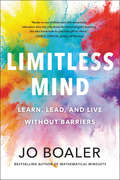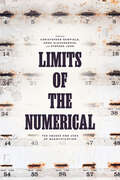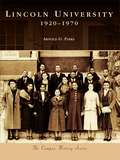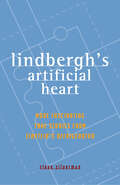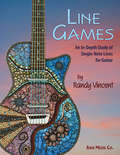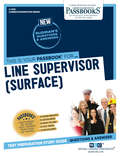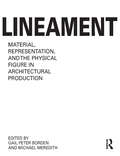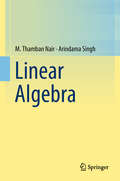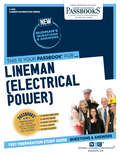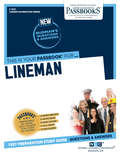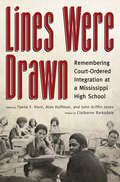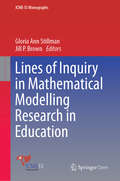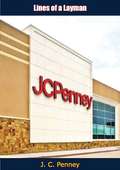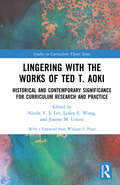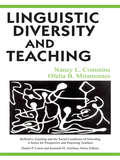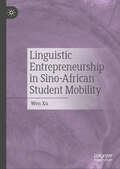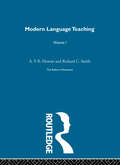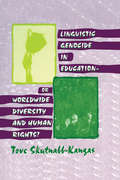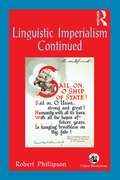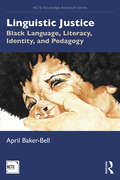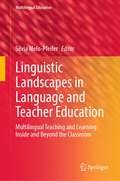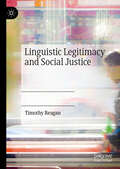- Table View
- List View
Limitless Mind: Learn, Lead, and Live Without Barriers
by Jo BoalerIn this revolutionary book, a professor of education at Stanford University and acclaimed math educator who has spent decades studying the impact of beliefs and bias on education, reveals the six keys to unlocking learning potential, based on the latest scientific findings.From the moment we enter school as children, we are made to feel as if our brains are fixed entities, capable of learning certain things and not others, influenced exclusively by genetics. This notion follows us into adulthood, where we tend to simply accept these established beliefs about our skillsets (i.e. that we don’t have “a math brain” or that we aren’t “the creative type”). These damaging—and as new science has revealed, false—assumptions have influenced all of us at some time, affecting our confidence and willingness to try new things and limiting our choices, and, ultimately, our futures. Stanford University professor, bestselling author, and acclaimed educator Jo Boaler has spent decades studying the impact of beliefs and bias on education. In Limitless Mind, she explodes these myths and reveals the six keys to unlocking our boundless learning potential. Her research proves that those who achieve at the highest levels do not do so because of a genetic inclination toward any one skill but because of the keys that she reveals in the book. Our brains are not “fixed,” but entirely capable of change, growth, adaptability, and rewiring. Want to be fluent in mathematics? Learn a foreign language? Play the guitar? Write a book? The truth is not only that anyone at any age can learn anything, but the act of learning itself fundamentally changes who we are, and as Boaler argues so elegantly in the pages of this book, what we go on to achieve.
Limits of the Numerical: The Abuses and Uses of Quantification
by Christopher Newfield Stephen John Anna AlexandrovaThis collection examines the uses of quantification in climate science, higher education, and health. Numbers are both controlling and fragile. They drive public policy, figuring into everything from college rankings to vaccine efficacy rates. At the same time, they are frequent objects of obfuscation, manipulation, or outright denial. This timely collection by a diverse group of humanists and social scientists challenges undue reverence or skepticism toward quantification and offers new ideas about how to harmonize quantitative with qualitative forms of knowledge. Limits of the Numerical focuses on quantification in several contexts: climate change; university teaching and research; and health, medicine, and well-being more broadly. This volume shows the many ways that qualitative and quantitative approaches can productively interact—how the limits of the numerical can be overcome through equitable partnerships with historical, institutional, and philosophical analysis. The authors show that we can use numbers to hold the powerful to account, but only when those numbers are themselves democratically accountable.
Limits of the Numerical: The Abuses and Uses of Quantification
by Christopher Newfield Stephen John Anna AlexandrovaThis collection examines the uses of quantification in climate science, higher education, and health. Numbers are both controlling and fragile. They drive public policy, figuring into everything from college rankings to vaccine efficacy rates. At the same time, they are frequent objects of obfuscation, manipulation, or outright denial. This timely collection by a diverse group of humanists and social scientists challenges undue reverence or skepticism toward quantification and offers new ideas about how to harmonize quantitative with qualitative forms of knowledge. Limits of the Numerical focuses on quantification in several contexts: climate change; university teaching and research; and health, medicine, and well-being more broadly. This volume shows the many ways that qualitative and quantitative approaches can productively interact—how the limits of the numerical can be overcome through equitable partnerships with historical, institutional, and philosophical analysis. The authors show that we can use numbers to hold the powerful to account, but only when those numbers are themselves democratically accountable.
Limits of the Numerical: The Abuses and Uses of Quantification
by Christopher Newfield Stephen John Anna AlexandrovaThis collection examines the uses of quantification in climate science, higher education, and health. Numbers are both controlling and fragile. They drive public policy, figuring into everything from college rankings to vaccine efficacy rates. At the same time, they are frequent objects of obfuscation, manipulation, or outright denial. This timely collection by a diverse group of humanists and social scientists challenges undue reverence or skepticism toward quantification and offers new ideas about how to harmonize quantitative with qualitative forms of knowledge. Limits of the Numerical focuses on quantification in several contexts: climate change; university teaching and research; and health, medicine, and well-being more broadly. This volume shows the many ways that qualitative and quantitative approaches can productively interact—how the limits of the numerical can be overcome through equitable partnerships with historical, institutional, and philosophical analysis. The authors show that we can use numbers to hold the powerful to account, but only when those numbers are themselves democratically accountable.
Lincoln Hall at the University of Illinois
by John HoffmannLincoln Hall at the University of Illinois, named to commemorate the centennial of Abraham Lincoln's birth, has long been a familiar landmark on the Urbana-Champaign campus and the home for undergraduate and graduate work in the liberal arts and communication. Funded by the Illinois State Legislature in 1909, the building was dedicated in 1913 on Lincoln's birthday, February 12. In addition to its function as space for offices, classrooms, and departmental libraries, Lincoln Hall was commissioned, designed, and built to convey "the wisdom and patriotism of the democracy of learning." That spirit of freedom and equality in education was manifest in Lincoln Hall's artistic design, which features terra cotta panels depicting Lincoln's life, quotations from his writings, and portraits of prominent figures of his day. At the outset of the building's conception, Evarts B. Greene, professor of history and dean of the College of Literature and Arts, provided detailed information about Lincoln that defined the building's artistic program. Wishing to retain the dignified simplicity of the overall design, he conferred with W. Carbys Zimmerman, the State Architect, about the nature and placement of the panels and other ornamental details that have become key features of the building's design. Commemorating the bicentennial of Lincoln's birth, this magisterial volume chronicles the history of Lincoln Hall from its conception to its expansion and its present role on the campus. John Hoffmann identifies each of the building's historical panels and the portraits of Lincoln's contemporaries. Lavishly illustrated to show how much care was taken with the details of the design, this book provides a lasting historical record of the building's century-long place at the University of Illinois. Supported by the Office of the Chancellor of the University of Illinois at Urbana-Champaign
Lincoln University: 1920-1970 (Campus History)
by Arnold G. ParksLincoln University was founded in 1866 for the education of freed blacks after the Civil War. This book focuses on the years between 1920 and 1970, a span of time during which many of the university'smost signifi cant developments occurred. During this period, Lincoln Institute was elevated to university status, and graduate programs were added to the curriculum. A court-ordered law school was established and graduated many accomplished and respected African American attorneys before disbanding in the 1950s. During this era, the university was often referred to as "the Harvard of the Midwest" due to the acclaimed reputation of its faculty. Many alumni have made outstanding contributions at local, state, and national levels. After the 1954 United States Supreme Court Brown v. Board of Education of Topeka decision, the university integrated its student body. As a result, student enrollment changed dramatically from all black to a signifi cantly white clientele. Today the university retains its designation as a historicallyblack college/university.
Lindbergh's Artificial Heart: More Fascinating True Stories from Einstein's Refrigerator
by Steve SilvermanAn all-new compendium of strange-but-true history and science facts from the author of Einstein&’s Refrigerator. When high school teacher Steve Silverman started posting fascinating facts on the internet, what began as a Web site for his students became an internationally sensation. He then compiled the silliest, most peculiar stories into the book Einstein's Refrigerator. Now comes silliness squared with Lindbergh's Artificial Heart, Silverman's second collection of offbeat and often hilarious stories that are absolutely true, yet not often taught in school. Fascinating entries include: The exploding whale: What did the Oregon Department of Transportation do with a dead whale that washed up on one of its beaches? Suffice it to say their decision to blow it up was quite the blubber blunder. Nose picking: Delve into the humorous findings of a study of this bad habit conducted by one of our institutions of higher learning. The fastest charcoal lighter ever: Using liquid oxygen at your family barbecue may speed up the cooking, but it does have its drawbacks . . . such as vaporizing your grill.
Line Games
by Randy VincentLine Games is an organized series of practical studies for the development of single-note guitar technique and jazz vocabulary simultaneously.
Line Supervisor: Passbooks Study Guide (Career Examination Series)
by National Learning CorporationThe Line Supervisor (Surface) Passbook® prepares you for your test by allowing you to take practice exams in the subjects you need to study. It provides hundreds of questions and answers in the areas that will likely be covered on your upcoming exam, including but not limited to: installation, troubleshooting, inspection, repair, testing and maintenance; supervisory methods and practices in accordance with rules, regulations, policy instructions, procedures, and labor-management practices; safe and efficient work practices and procedures; reading and interpreting technical drawings, wiring diagrams and schematics; job related mathematical calculations and other related areas; and more.
Lineament: Material, Representation and the Physical Figure in Architectural Production
by Gail Peter Borden and Michael MeredithThis comprehensive catalogue of contemporary work examines the renewed investment in the relationship between representation, materiality, and architecture. It assembles a range of diverse voices across various institutions, practices, generations, and geographies, through specific case studies that collectively present a broader theoretical intention.
Linear Algebra
by M. Thamban Nair Arindama SinghThis book introduces the fundamental concepts, techniques and results of linear algebra that form the basis of analysis, applied mathematics and algebra. Intended as a text for undergraduate students of mathematics, science and engineering with a knowledge of set theory, it discusses the concepts that are constantly used by scientists and engineers. It also lays the foundation for the language and framework for modern analysis and its applications. Divided into seven chapters, it discusses vector spaces, linear transformations, best approximation in inner product spaces, eigenvalues and eigenvectors, block diagonalisation, triangularisation, Jordan form, singular value decomposition, polar decomposition, and many more topics that are relevant to applications. The topics chosen have become well-established over the years and are still very much in use. The approach is both geometric and algebraic. It avoids distraction from the main theme by deferring the exercises to the end of each section. These exercises aim at reinforcing the learned concepts rather than as exposing readers to the tricks involved in the computation. Problems included at the end of each chapter are relatively advanced and require a deep understanding and assimilation of the topics.
Lineman: Passbooks Study Guide (Career Examination Series #C-2024)
by National Learning CorporationThe Lineman (Electrical Power) Passbook® prepares you for your test by allowing you to take practice exams in the subjects you need to study. It provides hundreds of questions and answers in the areas that will likely be covered on your upcoming exam, including but not limited to: basic principles of electricity; tools of the electric trade; operation of mechanical and electrical devices; installation and maintenance of electrical distribution pole lines; and more.
Lineman: Passbooks Study Guide (Career Examination Series #C-2024)
by National Learning CorporationThe Lineman Passbook® prepares you for your test by allowing you to take practice exams in the subjects you need to study. It provides hundreds of questions and answers in the areas that will likely be covered on your upcoming exam, including but not limited to: basic principles of electricity; tools of the electrical trade; operation of mechanical and electrical devices; installation and maintenance of electrical distribution pole lines; knowledge of transformers, conductors, overhead lines, underground lines, equipment and safety, grounding methods, service drops and laterals, poles and structures, electric supply stations; and more.
Lines Were Drawn: Remembering Court-Ordered Integration at a Mississippi High School
by Claiborne BarksdaleLines Were Drawn looks at a group of Mississippi teenagers whose entire high school experience, beginning in 1969, was under federal court-ordered racial integration. Through oral histories and other research, this group memoir considers how the students, despite their markedly different backgrounds, shared a common experience that greatly influences their present interactions and views of the world—sometimes in surprising ways. The book is also an exploration of memory and the ways in which the same event can be remembered in very different ways by the participants. The editors (proud members of Murrah High School's Class of 1973) and more than fifty students and teachers address the reality of forced desegregation in the Deep South from a unique perspective—that of the faculty and students who experienced it and made it work, however briefly. The book tries to capture the few years in which enough people were so willing to do something about racial division that they sacrificed immediate expectations to give integration a true chance. This period recognizes a rare moment when the political will almost caught up with the determination of the federal courts to finally do something about race. Because of that collision of circumstances, southerners of both races assembled in the public schools and made integration work by coming together, and this book seeks to capture those experiences for subsequent generations.
Lines of Inquiry in Mathematical Modelling Research in Education (ICME-13 Monographs)
by Gloria Ann Stillman Jill P. BrownThis open access book is based on selected presentations from Topic Study Group 21: Mathematical Applications and Modelling in the Teaching and Learning of Mathematics at the 13th International Congress on Mathematical Education (ICME 13), held in Hamburg, Germany on July 24–31, 2016. It contributes to the theory, research and teaching practice concerning this key topic by taking into account the importance of relations between mathematics and the real world. Further, the book addresses the “balancing act” between developing students’ modelling skills on the one hand, and using modelling to help them learn mathematics on the other, which arises from the integration of modelling into classrooms. The contributions, prepared by authors from 9 countries, reflect the spectrum of international debates on the topic, and the examples presented span schooling from years 1 to 12, teacher education, and teaching modelling at the tertiary level. In addition the book highlights professional learning and development for in-service teachers, particularly in systems where the introduction of modelling into curricula means reassessing how mathematics is taught. Given its scope, the book will appeal to researchers and teacher educators in mathematics education, as well as pre-service teachers and school and university educators
Lines of a Layman
by J. C. PenneyThe history of America’s commercial growth is highlighted with the names of a few great men whose contributions to their nation have far transcended ability in business, manufacturing and industry. Elbert Hubbard, John Wanamaker—these men were merchant princes in one sense, leaders of thought and belief in another. Through their autobiographical writings and essays, they have given us a rich, poignant, inspiring picture of their fruitful lives and careers. Their words point the way to meaningful, creative, productive and brotherly living.Such a man is J. C. Penney, at once the most successful of our times in business enterprise, and the most inspiring in his personal example of courage, wisdom, and service to fellow men and to God.Faith and fellowship are no mere Sunday things in J. C. Penney’s philosophy. You find a twenty-four-hour-a-day, seven-day-a-week code of Christian living in such pieces as his Six Principles for Daily Living, The Four Square Man, and The Christian and the Social Order. They are “the measure of the man.”You will find LINES OF A LAYMAN more than a book to read, although its almost 200 thoughtful vignettes are fascinating, swift-paced and stimulating. You will find that it is a book to use, even a book to live by. Its pages are charged with meaning; one cannot read them without finding new ways to happiness and creativity.
Lingering with the Works of Ted T. Aoki: Historical and Contemporary Significance for Curriculum Research and Practice (Studies in Curriculum Theory Series)
by Nicole Y. S. Lee Lesley E. Wong Joanne M. UrsinoThis unique collection of essays from emerging and established curriculum theory scholars documents individuals’ personal encounters and lingering interactions with Ted T. Aoki and his scholarship. The work illuminates the impact of Aoki’s lifework both theoretically and experientially. Featuring many of the field’s top scholars, the text reveals Aoki’s historical legacy and the contemporary significance of his work for educational research and practice. The influence of Aoki’s ideas, pedagogy, and philosophy on lived curriculum is vibrantly examined. Themes include tensionality, multiplicity, and bridging of difference. Ultimately, the text celebrates an Aokian "way of being" whilst engaging a diversity of perspectives, knowledges, and philosophies in education to reflect on the contribution of his work and its continual enrichment of curriculum scholarship today. This text will benefit researchers, academics, and educators with an interest in curriculum studies, educational research, teacher education, and the philosophy of education more broadly. Those specifically interested in international and comparative education, as well as interdisciplinary approaches – which include perspectives in arts, language and literacy, sciences, technology, and higher education curriculum – will also benefit from this book.
Linguistic Diversity and Teaching (Reflective Teaching and the Social Conditions of Schooling Series)
by Ofelia B. Miramontes Nancy L. ComminsLinguistic Diversity and Teaching raises questions and provides a context for reflection regarding the complex issues surrounding new English learners in the schools. These issues exist within a highly charged political climate and involve not only language, but also culture, class, ethnicity, and the persistent inequities that characterize our educational system. The text addresses these issues through conversations among experts, practitioners, and readers that are informed by representative case studies and by a range of theoretical approaches. It is designed to engage readers in beginning to evolve their own practical theories, to help them explore and perhaps modify some basic beliefs and assumptions, and to become acquainted with other points of view. Throughout, readers are encouraged to interact with the text and to develop their own perspective on the issue of linguistic diversity and teaching. This is the fourth volume in Reflective Teaching and the Social Conditions of Schooling: A Series for Prospective and Practicing Teachers, edited by Daniel P. Liston and Kenneth M. Zeichner. It follows the same format as previous volumes in the series.*Part I includes four cases dealing with different aspects of the impacts of the changing demographics of public schools. Each case is followed by space for readers to write their own reactions and reflections, and a set of reactions to the cases written by prospective and practicing teachers, administrators, and professors. *Part II presents three public arguments representing very different views about linguistic diversity: in public schools, English should be the only language of instruction; all children should receive instruction in both their first language and English; planning for instruction should be based not on absolutes, but on what is realistically possible in particular settings.*Part III offers the authors' own interpretations of the issues raised throughout the text, outlines a number of ways in which teachers can continue to explore these topics, and includes exercises for further reflection. A glossary and annotated bibliography are provided.This text is pertinent for all prospective and practicing teachers at any stage of their training. It can be used in any undergraduate or graduate course that addresses issues of language diversity and teaching.
Linguistic Entrepreneurship in Sino-African Student Mobility
by Wen XuThis book explores African international students’ lived experience within Chinese higher education, including their language ideologies, investment in Chinese language learning and the (re)shaping of identities and aspirations. Whilst high English proficiency has been sought by globally mobile students to play the ‘class game’ and gain entrée to the circle of elites, considerably less attention has been paid to how shifting global structures and China’s semi-peripheral position shape its language learners’ investment and identity construction. Drawing upon a series of interviews, the book deciphers African students’ logics of linguistic exchanges within the geopolitical and geo-economic context of China-African relations. The students invested heavily into Chinese language learning and use, while displaying perfectionism, linguistic entrepreneurship and linguistic insecurity. As the value of their Chinese linguistic capital increases, they reassessed their sense of themselves and produced different social identities, which includes the idea of ‘the world is my oyster’, contributing to Africa’s sustainable development and the disposition to ‘tell China’s story well’. This work transgresses monolingual dominance (i.e. English) in the existing body of international student mobility and second language acquisition (SLA) research, as great importance is assigned to Chinese as linguistic capital in South-South student migration. The book is of interest to researchers in international higher education, international student mobilities, sociolinguistics, applied linguistics, languages education, and Chinese language teaching and learning.
Linguistic Foundations: The Reform Movement (Logos Studies in Language and Linguistics)
by Richard C. Smith A. P. R. HowattThis volume forms part of a five volume set charting the progress of the nineteenth century movement which was instrumental in establishing international guidelines for the teaching of modern languages. It was during this period that for the first time, co-operation between phoneticians and teachers culminated in the publication of works that were instrumental in establishing the 'applied linguistic' approach to language teaching in the twentieth century. For the first time, too, the new science of psychology influenced a scientific theory of second language acquisition. The Reform Movement attracted support across Europe, spurring the development of new professional associations and journals. In turn, the publication in these journals of reports of innovative practice contributed to a greater sense of autonomy and professionalism among modern language teachers, who had hitherto tended to live under the shadow of classical language teaching. The practical innovations and theoretical suggestions for the foreign language teaching, although rooted in the nineteenth century, still have relevance today.
Linguistic Genocide in Education--or Worldwide Diversity and Human Rights?
by Tove Skutnabb-KangasIn this powerful, multidisciplinary book, Tove Skutnabb-Kangas shows how most indigenous and minority education contributes to linguistic genocide according to United Nations definitions. Theory is combined with a wealth of factual encyclopedic information and with many examples and vignettes. The examples come from all parts of the world and try to avoid Eurocentrism. Oriented toward theory and practice, facts and evaluations, and reflection and action, the book prompts readers to find information about the world and their local contexts, to reflect and to act. A Web site with additional resource materials to this book can be found at http://www.ruc.dk/~tovesk/
Linguistic Imperialism Continued
by Robert PhillipsonThis volume brings together key writings since the 1992 publication of Linguistic Imperialism – Robert Phillipson’s controversial benchmark volume, which triggered a major re-thinking of the English teaching profession by connecting the field to wider political and economic forces. Analyzing how the global dominance of English in all domains of power is maintained, legitimized and persists in the twenty-first century, Linguistic Imperialism Continued reflects and contributes in important ways to understanding these developments. This book is not for sale in India, Pakistan, Bangladesh, Sri Lanka, Nepal, and Bhutan.
Linguistic Justice: Black Language, Literacy, Identity, and Pedagogy (NCTE-Routledge Research Series)
by April Baker-BellBringing together theory, research, and practice to dismantle Anti-Black Linguistic Racism and white linguistic supremacy, this book provides ethnographic snapshots of how Black students navigate and negotiate their linguistic and racial identities across multiple contexts. By highlighting the counterstories of Black students, Baker-Bell demonstrates how traditional approaches to language education do not account for the emotional harm, internalized linguistic racism, or consequences these approaches have on Black students' sense of self and identity. This book presents Anti-Black Linguistic Racism as a framework that explicitly names and richly captures the linguistic violence, persecution, dehumanization, and marginalization Black Language-speakers endure when using their language in schools and in everyday life. To move toward Black linguistic liberation, Baker-Bell introduces a new way forward through Antiracist Black Language Pedagogy, a pedagogical approach that intentionally and unapologetically centers the linguistic, cultural, racial, intellectual, and self-confidence needs of Black students. This volume captures what Antiracist Black Language Pedagogy looks like in classrooms while simultaneously illustrating how theory, research, and practice can operate in tandem in pursuit of linguistic and racial justice. A crucial resource for educators, researchers, professors, and graduate students in language and literacy education, writing studies, sociology of education, sociolinguistics, and critical pedagogy, this book features a range of multimodal examples and practices through instructional maps, charts, artwork, and stories that reflect the urgent need for antiracist language pedagogies in our current social and political climate.
Linguistic Landscapes in Language and Teacher Education: Multilingual Teaching and Learning Inside and Beyond the Classroom (Multilingual Education #43)
by Sílvia Melo-PfeiferThis book offers an international account of the use of linguistic landscapes to promote multilingual education, from primary school to the university, and in teacher education programs. It brings linguistic landscapes to the forefront of multilingual education in school settings and teacher education, expanding the disciplinary domains through which they have been studied. Drawing on multidisciplinarity and placing linguistic landscapes in the field of language (teacher) education, this book presents empirical studies developed in eleven countries: Australia, France, Germany, Israel, Japan, Mozambique, The Netherlands, Portugal, Russia, Spain, and The United States. The chapters illustrate how multilingual pedagogies can be enhanced using linguistic landscapes in mainstream education and are written by partners of the Erasmus Plus project LoCALL “LOcal Linguistic Landscapes for global language education in the school context”.
Linguistic Legitimacy and Social Justice
by Timothy ReaganThis book examines the nature of human language and the ideology of linguistic legitimacy – the common set of beliefs about language differences that leads to the rejection of some language varieties and the valorization of others. It investigates a broad range of case studies of languages and dialects which have for various reasons been considered 'low-status' including: African American English, Spanglish, American Sign Language, Yiddish, Esperanto and other constructed languages, indigenous languages in post-colonial neo-European societies, and Afrikaans and related language issues in South Africa. Further, it discusses the implications of the ideology of linguistic legitimacy for the teaching and learning of foreign languages in the US. Written in a clear and accessible style, this book provides a readable and pedagogically useful tool to help readers comprehend the nature of human language, and the ways in which attitudes about human language can have either positive or negative consequences for communities and their languages. It will be of particular interest to language teachers and teacher educators, as well as students and scholars of applied linguistics, intercultural communication, minority languages and language extinction.
